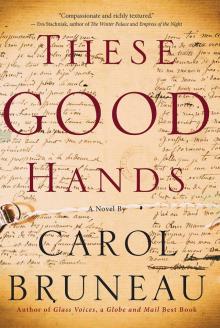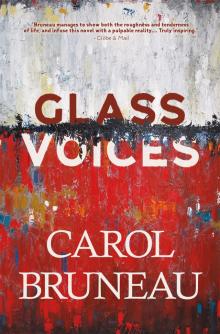- Home
- Carol Bruneau
A Circle on the Surface Page 3
A Circle on the Surface Read online
Page 3
Robart elbowed Isaac, pulled a flask from his pocket.
“What are you thinking, boy? Not in Marge’s house, put it away.” Isaac’s raspy voice turned almost unctuous as he raised his teacup to Enman. “Your ma could be a battleaxe, no question. But that was a good thing.” Then Isaac told the story of Enman’s father finding Enman in Lester Finck’s living room behind the store, Lester demonstrating how to play “Jack was Every Inch a Sailor” and how, overhearing this while buying cigarettes, Cleary Greene got so irked, jealous about Lester one-upping him over his son, that he’d barged in, ripped the accordion from Lester’s hands, and, well, everyone knew about the snow damage to its bellows and how Cleary ended up replacing it.
“Your mother didn’t brook fools easily. Used to see her in her garden. Missed her lately. Can’t believe she’s gone, can you?” Sylvester Meade, the neighbour between Ma’s house and the boatyard, stared at his shoes as he spoke. One of Sylvester’s sons and his wife wolfed down cookies as their two little boys played tag around the mahogany coffin. “Stop, now.” Win’s voice was sharp.
“It’s good to have you back, Greene”—Isaac stuck his foot out to trip the bigger kid—“You’ve got your job as long as you want it. Remember that.”
Una set the plate of cookies down on top of the desk. Enman knew she was listening.
“Well, now you’ve got the house, plenty of room for you and the Missus. Room to fill it with kids. Now that you’re here you’re here to stay, I guess.”
“That’s the plan?” Enman voiced it as a question not a statement. Una came close and pressed her little high heel into his foot. Then she slipped out of the room with a tray of Ma’s cups and saucers. He heard her working in the kitchen. Heard the back door opening, the squawk of seagulls outside. Burnt offerings, someone observed.
“Call the fire department.” Clinton Goodrow laughed and Win shot Clint a look. “They’ll be here soon enough, don’t joke. Those civil defence folks. They’ll be busy tonight, I heard. They said on the radio.” Everyone turned to look at Enman’s wireless, as if trained to do so, and in the process admired it. The latest thing, it shared its mahogany cabinet with a phonograph. Planning the funeral, Enman had been too busy to tune in. Isla trilled the famous code words meant to prepare them all for a blackout. “‘B is for butter.’”
Una reappeared. “Yes, and I’d like to know what they’d do in the event of an air raid, with their little air pumps and hoses. Those ARP people.” She let out a dismissive tsk. “In school, you know, we taught boys and girls how to recognize a Messerschmitt.”
“Is that right.” Isaac smiled. “Imagine that, little kids identifying enemy planes. Suffer the little children, eh, Father?”
The priest tightened his grip on his missal. “You miss the classroom, Mrs. Greene?” Enman gave Una an encouraging smile. It hurt to smile, the strain of Ma’s death catching up with him. The shocking strangeness of it. Una did not smile back, only nodded. There was a small silence.
“Have you had Una out to the island yet?” Clinton could be trusted to lighten awkward occasions, except he forgot how Enman hated boats.
“What’s out there, anyway?” Una sounded half interested.
“Oh well. A lot more than a lighthouse, don’t you know. It’s got the devil’s staircase.”
Una looked mildly intrigued. Clinton regaled her with the tall tale everybody knew, about a straight black crack in the granite out there, with steps in it leading into the sea.
“An intrusion dike.” Enman knew the geological term. “Like the boulders around here are ‘erratics’.” But Una wasn’t listening to him. Clint had launched into foolish lore, how at a dance one night a handsome, finely dressed stranger charmed the prettiest girls, hogging them all to himself. Chasing the stranger from the hall, their husbands and boyfriends saw he was wearing only one boot, his other foot being a hoof. “A cloven one.” Enman winked.
Una’s expression was half smile, half smirk. “Oh, go on.”
Clint continued. In his wake, the smoking trail the stranger blazed straight into the ocean hardened into a perfectly formed staircase of black stone.
“Magma.” Enman stroked his wife’s arm, let his hand linger at her elbow. Its sharpness through her sleeve was a comfort, it anchored him. She reached for his hand and squeezed it.
Then Win remarked how nice it was having the long bright evening, sparing them a little longer than usual the rigamarole of blackout blinds and candles. She brushed crumbs from her dress, watched Isla go to help Una wash up. Clint lifted two of the chairs they brought. “Darn those air raid people and their precautions, anyway. Surely they’d make allowances for a wake.”
Isaac put on his cap and leaned in to Enman. “Take all the time you need, boy. But don’t forget, we’ve got that meetin’ in a few weeks. I’m counting on you to ace it.”
Greeley and Robart stayed where they were. Greeley eyed Enman. “Come on outside, we’ll raise a toast. What’s a wake without a tot?”
Enman hesitated. He thought better of doing so. But as the room emptied, he couldn’t stand the thought of being in the house with the body and only Una nearby, God love her efforts to feed people, at least she tried. Ma’s death had come as no surprise, but the neighbours’ camaraderie did. Just their presence helped him—though some had not shown up: Lester Finck’s widow, Iris, and Barton Twomey, but that was fine. And Clint’s crazy tale about the devil added levity to things, until Enman imagined Ma picking up where the priest left off: “Oh blessed mother of God, to thee we raise our cries, mourning and weeping in this valley of tears.”
Life was a vale but there were plenty of things to help you through it.
“Sure, just a little shot, fellas. Nothing wrong with one, one would be all right.”
The sun had just set, and the three of them stood out back in the treeless yard, passing Robart’s flask of rum. The house was on a low knoll overlooking Barrein’s tiny harbour and the shoreline’s rocky fingers of land. They reached into the sea as far as you could make out, and further along near Ma’s old birthplace a headland rose, spiky with spruce. It had made Enman think of a porcupine when he was a boy, and still did. From up here you could see most of the village, even in the deepening dark, ten or so houses scattered along the shores and head of the inlet, small wooden capes like Ma’s, like his, now. Five rooms, including the bathroom that had been created by one bedroom being halved, a tiny hall and staircase, a cellar not much deeper than a crawl space, an outdoor privy.
At least two people from each house had been present this evening, a few Enman hadn’t seen in years. Across the harbour, just opposite, he could see the arched gable window of the Fincks’ house, the tall, forbidding place which had always housed the store and post office, and would continue to, he expected, until Iris, like Ma, expired. There was something soothing, restorative, about the view. He supposed it was because it contrasted so sharply with the city, where you were hard-pressed to find a quiet spot away from servicemen roaming the streets. He had known this day was coming, that the house would end up being his, and he had dreaded it. But now thinking of the contrast made him calm.
Greeley passed Enman the flask and he took a good long haul from it. It had been some time since he had allowed himself a drink. Robart talked business, so much repair work coming to the smaller yards since the major shipyards couldn’t keep up. “Well, all that loss out there”—Greeley waved the flask, gesturing towards the sea—“someone should benefit. Better us, I guess.”
Enman thought, maybe not for the first time but with a bit of a shock, how it mightn’t be so bad staying. He could do a lot worse. Robart talked about the meeting coming up in July, the meeting at the bank where Enman had recently worked. At the far end of the village, in the opposite direction from where the beach lay, past the church and the cemetery, a dull light twinkled at Barton Twomey’s place. Not everyone worried about a visit from t
he defence warden, a volunteer based in O’Leery, or about being fined.
“How are you doing, anyways?” Greeley’s voice had turned tentative. He wasn’t asking about losing Ma, Enman knew. Robart and Greeley were eight and ten years younger than he was, respectively. Perhaps being younger made them curious, in a vaguely eager way, about what had happened to him. More curious than their father was, Isaac already knowing how it felt, maybe, being slightly hobbled.
“Oh, you know. I’ve still got pain. But my old legs, they work fine. Fine enough. Can’t complain.” Still, he wished Greeley hadn’t brought it up. The moon had risen, a full, bright moon, which cast an explosion of light over the sea’s blackness. Enman watched the horizon uneasily. The low, dark outline of the island was barely visible, its lighthouse in full darkness. The Devil’s Staircase, indeed. “They don’t always black out the beam, though, do they?”
Both men shrugged. “Sometimes yes, sometimes no. It’s just routine, this blackout business.” Robart took a drink, wiped his mouth, set the rum atop the huge rock shielding Ma’s flowerbed, a formation she had likened to a rhinoceros. Greeley lit a cigarette. Enman lit one too.
“Must’ve been hell on wheels out there, buddy.” Robart held his cigarette out for a light.
“One way of putting it.” Enman tried to laugh, but his breath felt locked in his chest. There it was, alive in his imagination: the night almost a year and a half ago when he had been out on that same sea and his ship got hit. He could still almost hear the whine of the torpedo aimed towards them, its shearing blast hitting the tanker he had signed himself onto.
“What were you doin’, joining the navy, of all things?” Greeley must have heard Isaac’s stories about Cleary Greene throwing his son off the wharf. “Sink or swim,” Enman’s father had said. Enman was only three or four years old. He’d grown up hating the water, hating the sea. Sink or swim, though. His former manager at the bank, who had become a good friend, almost like a brother, had joined the merchant marine. George Archibald had planted the idea: the best way to overcome fear is to face it.
“Why the hell not the army, though?” Robart looked mystified.
Enman shrugged, picked up the flask, shook it. “Who knows. I thought I was being brave. I hated walking. Never saw myself marching.” He laughed again. He hoped neither of them heard his voice quaver. “Don’t suppose you’ve got more of that stuff tucked away somewhere? That barely wet my whistle.” Remembering that fiery February night at sea, the last time he had seen George alive, made him want to drink.
“Could always pay a visit to Twomey.”
“Not a thirst strong enough to send me to that bastard.”
Una came out and stood on the doorstep. She looked a bit at a loss, waving to him. “You’re not leaving me alone in there.” Her face and the bits of grey in her curls picked up touches of moonlight, the same silver light outlining the flowerpots in the mudroom window. Ma is the one who’s left alone, he thought. Turning, nodding to both brothers, he stubbed out his cigarette, followed Una inside. The kitchen was tidy, Ma’s dishes were neatly stacked on the little shelves, the baking things salvaged with a good quick scrubbing, and put away.
“I’ve put fresh sheets on, cleared out the last of the medicines and that.” She had stripped Ma’s bed after Doull’s, the undertaker, had come from O’Leery and taken the body to prepare it. She had washed all the bedding and dried it on the clothesline where the old man’s rosary still hung, placed there by Ma to ward off bad weather, a precaution.
“I’m not sure I’m ready to sleep in her bed.” Or share the bed his parents had all through their long rocky marriage.
“I know. But it’s only for a little while, isn’t it. And it’ll be more comfy.” A step up from sharing his boyhood bed, Una meant, the spool one in the room divided to make space for the bathroom.
She took his hand, drew him past the front room, dark as a cave through the open doorway, led him up the stairs as steep and narrow as a ship’s ladder. After Enman and Una had moved in, Ma had not descended them again.
Una had done a good job of clearing out his mother’s effects, packing them into cardboard boxes, sliding the boxes into the cupboard under the eaves in his old bedroom. Una is nothing if not efficient, he thought. When they met six months ago she’d told him how she could control with ease a room of forty or fifty ten-year-olds. He had told this to Ma to impress her.
Ma, however, had not been as impressed as he hoped. “I don’t approve of wartime marriages, son.”
“But this one, you’ll see, is different.”
“There’s a war on, last time I heard.” She hadn’t attempted to hide her dismay. “You married someone you knew for three weeks.”
Two weeks, actually. But, fudging it slightly, he had corrected her: “A month, Ma.”
“That quick on your feet, you could’ve married Win before that Clinton came along.”
The room had been stripped of Ma’s presence. But now her absence was palpable, it was a presence in itself which Enman felt as a numbness that hovered about his ears and shoulders, a sensation that was neither chilly nor warm but there. He balked, undressing, folding his clothes over the ladderback chair his father had used for that purpose. Then he slid under the sheet beside his wife. Turning to him, Una pressed herself against him in the mattress’s sag. Her nightie had ridden up a little, her legs warmed his. The soft warmth of her skin helped drive the numbness away.
“About this baby business.” She curled closer. “You know, after forming so many kids in the classroom, I wouldn’t mind forming one of my own. It would be fun, wouldn’t it?”
“One of your own? Takes two, I thought.” Then he kissed her hair, glad just to have the wake and its prayers behind him. First thing in the morning would be the funeral mass, followed by Ma’s burial. Though the moment struck Enman as being an odd time to discuss babies, he chose to take comfort in it. “If that’s what you’d like, as I told you before, I suppose then I’m up for it.”
4
Snuggled next to Enman, Una listened to him drifting off. Even with her talcum powders and colognes replacing Mrs. Greene’s dried-up potions arranged on the dresser, it was dismaying to lie in the old woman’s spot. When her own mother died, Una had the cleaning lady help sort, then bundle everything off to charity. Even with assistance, dismantling the trappings of her mother’s life had taken many months. An inverse of Rome wasn’t built in a day, a saying both Una’s parents favoured when advising patience all through her growing up. Her mother only stopped saying it when Una began looking after her, while figuring out what to do with her own life. “Where would I be without you?” her mother often said, along with something Una remembered just as vividly. “A child is a comfort, you know—unlike a husband. Sadly, you can’t have one without the other.” A tacit recommendation against marriage, it seemed rather dead-end. It wasn’t until after her mother died that Una enrolled in teacher’s college.
Una had never thought she would marry, nor had she thought she wouldn’t. She had felt the same way about having children. Having wed Enman without hesitation, she suspected that the saying about building Rome—as well as the saying about doing as people did when in Rome—applied to marriage as much as it applied to having children. Her doctor in the city, Dr. Snow, not the quack in O’Leery, had said as much during her appointment in February, just after Valentine’s Day and before her birthday. After a two-day honeymoon at the start of January, she and Enman had celebrated their first month of marriage by dining out most evenings at the Green Lantern or Diana Sweet’s restaurant, much to her relief.
Seeing Dr. Snow, she had simply wanted to ensure that all was well, all was normal.
“Timing is important, if you’re thinking of starting a family.” Snow had inspected her with his warm brown eyes. “You might begin doing some exercises. Tighten up the pelvic floor.” He even recommended that she take her temperature f
irst thing each morning, and afterwards she had rushed to the drugstore to purchase a thermometer.
“Each fraction of a degree can help you determine,” the doctor’s voice came back to her now, as Enman shifted slightly in his sleep, “when you and your husband should be most successful.”
“We’re both good with numbers.” She’d said it to ward off any embarrassment. “Enman a little better than I, though.”
“Now, remember, you’re an active participant. How old is hubby, again?”
Hearing that Enman was forty-five, Dr. Snow had made a few more recommendations. “Don’t forget to write down your readings—it’s important to keep track.” He also suggested having a pillow under her bottom to help with the angle of penetration, a recommendation that made her blush. “Oh, and stay still afterwards. Don’t be jumping up to have a cigarette.”
This would hardly be an issue, she said, since she didn’t smoke.
Unaware of her troubles, however, Snow hadn’t raised the issue of what effect stress could have on the whole enterprise—the stress of an occasionally surprised, hungry, or balky husband. Or of her nerves and nighttime worries, occasional insomnia over what had happened, the reason she had been let go from her job. It had taken place just before Christmastime, the days leading up to the holidays.
And no one could have predicted Mrs. Greene’s illness.
Especially on the eve of the funeral, sleep might have offered respite and would have, if not for Enman’s snore, his bearish heat trapped in the mattress’s sag. His poor mother’s olfactory ghost infused there, the memory of her wheezing from its springs. It was almost enough to make Una want to creep back in to his childhood bed and sleep alone.

 These Good Hands
These Good Hands A Circle on the Surface
A Circle on the Surface Glass Voices
Glass Voices Berth
Berth Brighten the Corner Where You Are
Brighten the Corner Where You Are A bird on every tree
A bird on every tree